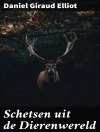In ‘Kazan, ‘ James Oliver Curwood masterfully weaves a narrative that combines adventure, nature, and the profound bond between humans and animals. Set against the captivating backdrop of the Canadian wilderness, the novel follows Kazan, a mixed-breed dog, on his tumultuous journey of survival and identity. Curwood’s writing style is rich with vivid descriptions and an emotional depth that brings the natural world to life, engaging readers with both the physical trials faced by Kazan and the internal struggles of his existence. This book not only serves as a gripping tale of loyalty and courage but also explores themes of freedom, isolation, and the inherent struggle for survival inherent in nature, reflecting the author’s fascination with wildlife and outdoor settings characteristic of early 20th-century American literature. James Oliver Curwood was an accomplished author and conservationist whose deep love for the wilderness significantly influenced his literary works. Born in 1878 in Michigan, Curwood embarked on numerous adventures in the great outdoors, which undoubtedly informed his understanding of nature’s beauty and brutality. His personal experiences with wild animals, coupled with a commitment to environmental preservation, shaped ‘Kazan’ into a poignant reflection on the relationship between humans and the wilderness, thus cementing Curwood’s legacy as a pioneer of nature writing in American literature. For readers seeking an enthralling tale infused with naturalistic themes and emotional resonance, ‘Kazan’ is highly recommended. This novel will captivate those interested in stories of animal resilience and the ever-complex interplay between instinct and companionship, while also offering profound insights into the human condition mirrored through the animal experience.
关于作者
James Oliver Curwood was an American novelist and conservationist born on June 12, 1878, in Owosso, Michigan. He became a well-known author in the early 20th century, reputed for his adventure stories set in the Canadian wilderness, which reflected his own love for nature and meticulous research. Curwood’s literary style often encompasses vivid descriptions of the landscape, intertwined with the inner lives and emotions of his characters, reflecting the juxtaposition of human drama against the backdrop of the natural world. Among his many works, ‘Kazan’ stands out as a prime example of his storytelling prowess, showcasing the journey and trials of a half-wolf, half-dog, navigating the challenges of the wilderness and the human heart. A prolific writer, Curwood penned over 30 novels, and many were later adapted into films, broadening his influence beyond the page. His writing career was a testament to his deep connection with the wild and a source of inspiration for readers fascinated by nature’s untamed beauty. Curwood’s devotion to the wilderness went beyond the written word, as evidenced by his conservation efforts; he championed the protection of environmental resources long before it became a widespread movement. He died on August 13, 1927, in Owosso, but his legacy endures in both his preservation efforts and in the adventures captured within the pages of his novels.












